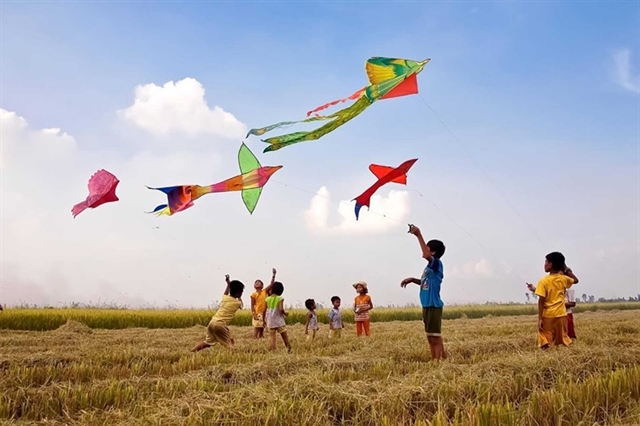 Politics & Law
Politics & Law

 |
| Việt Nam always engages responsibly and actively contributes to the protection of human rights, with a particular focus on safeguarding the rights of women and children. — Photo courtesy of UNICEF |
HÀ NỘI – The United Nations (UN) General Assembly adopted the Universal Declaration of Human Rights on December 10, 1948, designating the date as Human Rights Day to honour humanity's tireless efforts in protecting peace and respecting and defending national independence and sovereignty, as well as human rights.
Over the past 76 years, the declaration has served as the norm for nations, individuals, and social organisations to strive for respect for human freedoms and to ensure the global recognition and implementation of these rights, whether in UN member states or non-self-governing territories.
As a result, Human Rights Day is celebrated worldwide, including in Việt Nam.
In the Southeast Asian nation, human rights principles and values regarding freedom and democracy have been enshrined in the 1946 Constitution, even before the adoption of the 1948 declaration. Further, in the subsequent versions of the Constitution in 1959, 1980, and 1992, and especially 2013, Việt Nam has increasingly emphasised universal human rights principles recognised by the international community.
On September 2, 1945, in Ba Đình Square, President Hồ Chí Minh delivered the Declaration of Independence on behalf of the Provisional National Government, affirming the sacred, inviolable right of the Việtnamese people to independence.
“A nation undauntedly fought the French yoke of slavery for 80 years. A nation undauntedly sided with the alliance against fascism for years. That nation should have freedom! That nation should have independence,” the 1945 declaration read.
Following the success of the August Revolution, the Party, Government and President Hồ Chí Minh enacted a series of policies to implement the freedoms and democratic rights outlined in the declaration. The organisation of the first general election and the first Constitution of the Democratic Republic of Việt Nam in 1946 marked the realisation of the human and civil rights mentioned in the Declaration of Independence.
Respecting and protecting human rights remains a consistent policy of the Vietnamese Party and State. Since its establishment, Việt Nam has fully participated in human rights protection activities led by the UN and international organisations. These efforts include signing the Convention on the Rights of the Child, caring for and protecting the elderly, participating in anti-war activities, promoting peace, protecting the ecological environment, and respecting the right to self-determination of nations.
The Party and State have consistently affirmed that human rights are a common value of humanity. People are both the objective and the driving force in national development and defence, ensuring and promoting human rights is a key factor for sustainable development. Accordingly, human rights standards have been consolidated and fostered and people's lives have steadily improved.
Việt Nam has also taken concrete actions to implement human rights according to the conventions it has signed. Notably, its 2015 Penal Code continued to abolish the death penalty for eight crimes and excluded its application for those under 18, pregnant women, women with children under 36 months and individuals over 75 years old who commit crimes. To date, Việt Nam has ratified seven out of nine major UN human rights conventions and 25 others of the International Labour Organisation (ILO). Compared to many countries, Việt Nam is on par in terms of the number of conventions it has signed.
Việt Nam was elected as a non-permanent member of the UN Security Council (2008–2009 and 2020–2021 tenures) and as a member of the UN Human Rights Council (2014–2016 and currently for 2023–2025), which reflects international recognition of the country’s efforts to ensure and enforce human rights.
After nearly 40 years of reform, the Party and State have remained consistent in their policies to respect, ensure and protect the rights and obligations of citizens. Every decision is driven by the needs of the people and all development outcomes aim to best ensure human rights.
In Việt Nam's National Report under the fourth cycle of the Universal Periodic Review (UPR) in April 2024, Deputy Minister of Foreign Affairs Đỗ Hùng Việt highlighted that since 2019, Việt Nam's GDP per capita has increased by 25 per cent, while its poverty rate has decreased by 1.5 per cent annually.
The preventive medicine network is widely established nationwide and closely linked with primary healthcare and the health insurance coverage rate has expanded from over 81 per cent in 2016 to 93.35 per cent in 2023. Furthermore, 85 per cent of disadvantaged people with disabilities receive social assistance, care and rehabilitation services.
The media, press and the internet have flourished, becoming platforms for people and social organisations to express their views and tools for monitoring policy and law enforcement and protecting people's legal rights and interests.
Currently, around 72,000 associations in Việt Nam regularly and actively participate in addressing key socioeconomic issues.
According to the Ministry of Information and Communications, the number of internet users in Việt Nam rose to more than 78 million this year, from only 20 million in 2008, and it is expected to continue growing in the next five years to reach about 100 million by 2029.
Reflecting on Việt Nam's human rights efforts over the years, Prime Minister Phạm Minh Chính said: “The greatest human right in Việt Nam is to ensure that its 100 million people live in prosperity, happiness, democracy, peace, security and safety, while maximising human potential”. — VNS





.jpg)


.jpg)
